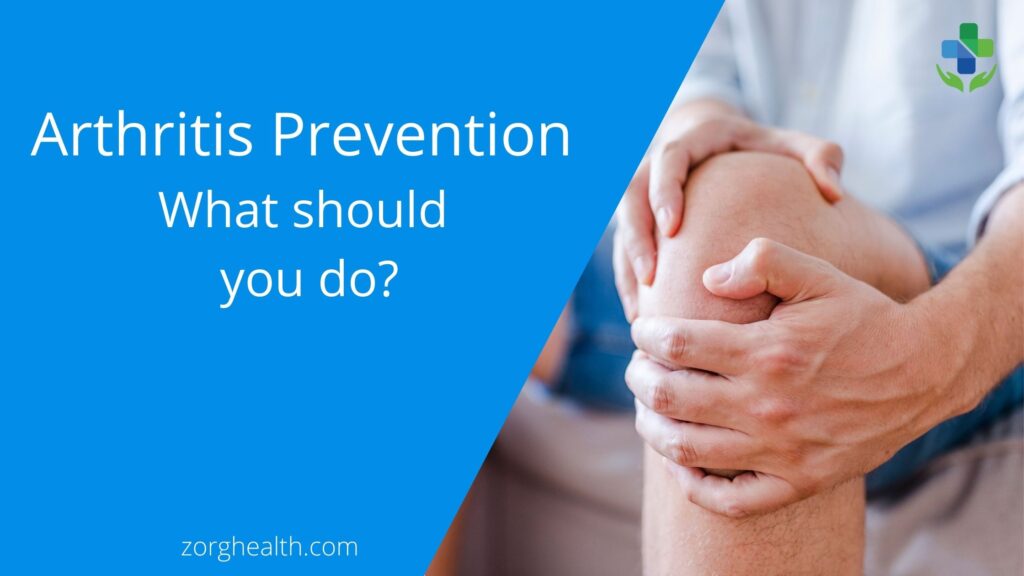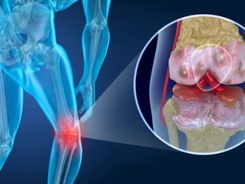Arthritis is a term that describes a family of medical conditions; specifically, rheumatic arthritis is a condition that causes pain, inflammation, and stiffness in the joints. Arthritis is a progressive and rheumatic condition that affects joints, the tissues that surround the joint, and other connective tissue. Living with arthritis is very challenging and knowing some advice on Arthritis Prevention can drastically reduce your pain.

Understanding Arthritis
There are different types of arthritis with similar symptoms that can affect the joints and other areas of the body. Some common types of arthritis include osteoarthritis (OA), Rheumatoid Arthritis (RA), and Psoriatic Arthritis (PsA). Irrespective of the arthritis type, it causes pain and lasting damage to the joints.
Although the risk of arthritis increases with age, it is usually found common in older people beyond 65 years. It occurs when the cartilage (cushioning tissue) around your joints starts to wear out. Over time, this condition causes pain, limits mobility, and may even cause joint deformity.
Arthritis is a common chronic health condition and may worsen over time. Correct diagnosis and right treatment are vital to future complications and help a person live a more active life. Also, genetic traits can increase your chances of developing arthritis. If you have a familial tendency of auto-immune diseases then you must know about arthritis prevention.
Symptoms of Arthritis
Different types of arthritis can cause similar symptoms. You may notice the symptoms developing gradually or suddenly.
At the beginning of the condition, one may only experience mild discomfort, however, the symptoms can worsen over time affecting your daily life.
The symptoms can feel worse especially in the morning while getting out of bed or upon standing up after being resting.
Some Symptoms of arthritis are:
- Pain in the joints
- Loss of motion, possible grinding or cracking
- Swollen tender joints which may turn red
- Wearing away of soft tissues
- Muscle weakness around the different joint
Early correct diagnosis can help determine the most effective treatment options.

Causes of Arthritis
As there is no single cause across the types of arthritis, the causes differ as to the type of arthritis. Sometimes arthritis can occur with no known cause. But some factors can increase your risk for all types of arthritis.
Following are some of the factors that can cause the development of arthritis. There are some factors that are modifiable while others are not.
- Injury or overuse injuries (causing degenerative arthritis)
- Abnormal metabolism (causing gout and pseudogout)
- Genetic makeup or Inheritance (Osteoarthritis)
- Infections (Lyme disease)
- Immune system dysfunction (RA and SLE)
- Wear and tear of a joint from excessive or overuse
- Age (beyond 60 years more likely to develop)
- Autoimmune disorders
- Muscle weakness
- Obesity and overweight
- Sex (females more prone to arthritis)
- Occupation (jobs needing constant knew bending or squatting)
- Others (disorders related to skin, saliva, bowel disease)
Risk factors from Arthritis
The following possible complications are associated with Arthritis.
- Reduced mobility that interferes in daily routine
- Raised risk of metabolic disorders like diabetes, high BP etc.
- Possible weight gains due to decreased movements
- Spread of inflammation in other parts of the body like skin, eyes etc.
- Risks to experience fall causing possible fractures
- Decreased ability and efficiency to perform at the workplace
- Possible impact on mental health like anxiety, social isolation and depression
Treatment options for Arthritis Prevention
The disease has no known cure for arthritis; pain will come and go with many types of arthritis. Treatment to control pain and minimise joint damage includes a range of the following options:
- Medications
- Physical therapies
- Non-pharmacologic therapies
- Physical/occupational therapy
- Splints/joint assistive aids
- Weight loss program
- Surgery (example, joint replacement)
- Patient education and support
Arthritis prevention by home remedies and lifestyle strategies
Also, there are plenty of home remedies and lifestyle strategies to ease symptoms and improve the overall quality of life. These include:
- Encouraging the joints to move by staying physically active regularly (brisk walk, exercise, aerobics, swimming, Taichi)
- Taking hot and cold therapy
- Engaging in massages (light to moderate)
- Maintaining a healthy weight to avoid putting extra pressure on the joints
- Eating an anti-inflammatory diet/antioxidant-rich diet
- Finding a balance between constructive rest and activity
- Being organised with tracking symptoms, medications, consultations
- Protecting joints from unnecessary stress
- Improving sleep patterns
- Applying heat/ice to the joints to reduce inflammation
- Getting regular check-ups with the doctor
- Trying alternative therapies (like acupuncture/balneotherapy/acupressure)
- Refraining from smoking
- Wearing proper protective equipment to prevent injuries
- Managing stress by yoga, mindfulness meditation
- Sitting up straight to keep the body aligned
- Reducing cholesterol with the right diet
- More intake of fresh foods and avoiding processed foods
How to prevent arthritis by food
Some foods are known to reduce or fight inflammation in the body. Eating enough antioxidants and following an anti-inflammatory diet can improve symptoms and may help to prevent further damage to the joints.
A balanced nutritious diet will help in fighting against rheumatic arthritis and also will help to prevent further damage to the joints. Even just avoiding or restricting foods that contribute to inflammation will give you much comfort.
Research shows that dietary interventions, such as eliminating certain foods and nutrients, may reduce symptom severity in people by fighting inflammation, enhancing nutrition, and improving bone, muscle, and immune system function.
- Mediterranean diet
Eating a balanced diet rich in plants, fibre, and anti-inflammatory fats can help people living with arthritis to maintain a healthy weight.
A Mediterranean diet can provide many nutrients that are good for overall health especially for joints, boosting the immune system, helping the body to fight off infection. This diet is full of antioxidants and anti-inflammatory compounds.
- Fish – Sardine, mackerel, salmon, tune etc.
- Nuts and seeds – Walnuts, pine nuts, pistachios, almonds
- Fruits and vegetables – Dark leafy greens like spinach, kale, broccoli, berries
- Beans – Red beans, black beans, chickpeas, red kidney beans
- Olive oil – Extra virgin oil in cooking or salads
- Whole grains – Legumes, cereals, brown rice
- Omega-3 fatty acids
Omega-3s are a type of essential fatty acid having anti-inflammatory properties and helps to regulate the immune system. Fish oil, nuts and seeds are rich in omega-3 fatty acids. Omega-3s have also been shown to improve mood or depression.
- Vitamin D
Vitamin D is not just for strong bones, it also helps maintain the function of the immune system. People can get vitamin D from sun exposure and certain foods
- Low-Fat Dairy Products
Dairy products like milk, yoghurt, and cheese are rich in calcium and vitamin D increases bone strength that may improve painful symptoms. It also helps to build muscles. GO for low-fat options for people aiming for weight loss.
Foods items having anti-arthritic and anti-inflammatory properties
The following food items have compounds of anti-arthritic and anti-inflammatory properties and are recommended as natural treatments for arthritis:
- Turmeric
- Ginger
- Grapes and berries
- Garlic, onion, leeks
- Green tea
- Soy
- Broccoli
- Coconut oil
- Sweet potato, squash, carrots
- Citrus fruits, kiwi
- Gin-soaked raisins
Other strategies to reduce symptoms of Arthritis
Other strategies to reduce joint pain, inflammation and bring relief includes:
- Applying apple cider vinegar to affected areas of skin to help with scalp psoriasis
- Apply capsaicin cream (a compound that makes chilli peppers hot) to numb pain receptors
- Add Epsom salts or dead sea salts during warm baths
- Put tea tree oil or apply creams with Oregon grape to help relieve skin symptoms
- Put Oatmeal or aloe vera paste to soothe irritated skin patches
- Use borage oil or eucalyptus oil that may relieve pain and inflammation
Arthritis Prevention by Avoiding Some Specific food
Here are the foods that people with arthritis may want to avoid.
- Avoiding dairy, acidic foods, and nightshade vegetables, such as tomatoes, potatoes, and eggplant
- Avoiding processed sugars in beverages including soda, sweet tea, flavoured coffees, and some juice drinks
- Avoiding foods with high saturated fats or trans-fat (pizza, butter, cheese and red meat) that may cause inflammation in the fat tissues
- Avoiding foods that have refined carbohydrates (white bread, white rice, and potato chips) that may stimulate inflammation in the body
- Avoiding processed foods (ready-made meals, fast food, and cookies) that are high in fats
- Incorporating probiotics into the diet can also reduce the progression and symptoms of the disease
- Avoid substances containing purines (that body converts to uric acid). Avoid items like red meat, organ meat, alcohol, cured meats, mussels, scallops that are high in purines.
The Bottom Line
Arthritis is a painful condition that makes your day-to-day life very challenging.
Arthritis can make you feel stiff and achy. It may cause multiple symptoms and reduce your ability to perform everyday tasks. Arthritis doesn’t come alone it has different risk factors associated with it.
It is important to know the tips for Arthritis prevention for the early treatment. If left untreated, some types of arthritis may worsen over time, cause permanent disability and affect your day-to-day life.
Although people can manage their symptoms with medical treatments, exercise, and proper nutrition, naturally occurring compounds in certain herbs could serve as complementary treatment options.
Keeping yourself physically active has a positive effect on arthritis and can improve pain, function, and mental health. There is no specific diet plan for arthritis, but some types of food may help in reducing pain and inflammation. Diets high in fibre and rich in raw fruits, vegetables, legumes, and lean proteins are your best bet for feeling upright.
Timely and adequate treatment may not only prevent future complications but also help a person live a more active life.
